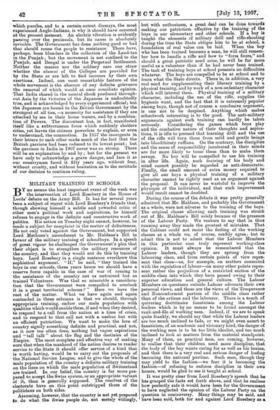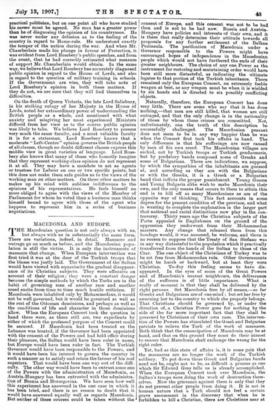MILITARY TRAINING IN SCHOOLS.
13Y no means the least important event of the week was the intervention of Lord Rosebery in the House of Lords' debate on the Army Bill. It has for several years been a subject of regret with Lord Rosebery's friends that, though showing himself a subtle and powerful critic of other men's political work and aspirations, he himself refuses to engage in the definite and constructive work of politics. His action on Tuesday night cannot, however, be made a subject for complaint in the matter of definiteness. He not only voted against the Government, but supported Lord Methuen's amendment to Mr. Haldane's Bill in favour of the military training of schoolboys. In a speech of great. vigour he challenged the Government's plea that their object is to strengthen the military resources of the country, and that they would not do this by training boys. Lord Rosebery in a single sentence overthrew this sophistical argument. " If," he said, " they trained the. boys in our schools, three years hence we should have a reserve force capable in the case of war of coming to the assistance of the country not as untrained but as trained Volunteers. Was that so miserable a considera- tion that the Government were compelled to overlook it in a, great territorial scheme ? " Here we have the root of the matter. What we have again and again contended in these columns is that we should, through appropriate training, endow our male population with qualities which would enable them, if and when they desired, to. respond to a call from the nation at a time of crisis, and to respond to that call not with a useless but with an efficient patriotism. We want to make the love of country signify something definite and practical, and not, as it now the often does, nothing but vague aspirations and " tall talk " about the flag and the destinies of the Empire. The most complete and effective way of making sure that when the manhood of the nation desires to render service to the State it should offer service of a kind that is worth baying, would be to carry out the proposals of the National Service League, and to give the whole of the male population of the country a definite military training on the lines on which the male population of Switzerland are trained. In our belief, the country is far more pre- pared to accept the Swiss system, or an appropriate variant of it than is generally supposed. The resolves of the electorate have on this point outstripped those of the politicians on both sides. Assuming, however, that the country is not yet prepared to do what the Swiss people do, not merely willingly, but with enthusiasm, a great deal can be done toward* making our patriotism effective by the training of the boys in our elementary and other schools. If a boy is taught the elements of military drill and 'rifle-shooting during the time the State obliges hint to be at school, a. foundation of real value can be laid. When the boy who has been trained becomes a man, he will still remem- ber how to handle a rifle and how to " form fours," and should a great patriotic need arise, he will be far more useful as a volunteer than if he had never been trained. The task of training boys at school presents no difficulties whatever. The boys are compelled to be at school and to learn what the State directs. There is, in addition, a very real need for supplementing their literary training by a physical training, and by work of a non-sedentary character which will interest them. Physical training of a military character, including the use of the rifle, supplies the hygienic want, and the fact that it is extremely popular among boys, though not of course a conclusive argument, is one not to be despised. Anything which makes schoolwork interesting is to the good. The anti-military arguments against such training can hardly be taken seriously. Considering the games which boys play and the combative nature of their thoughts and aspira. tions, it is idle to pretend that learning drill and the use of the rifle will turn them from mild and gentle beings into bloodthirsty ruffians. On the contrary, the discipline and the sense of responsibility inculcated in their minds are far more likely to tame them than to make them savage. No boy will be compelled to use his training in after life. Again, such training of his body and mind cannot possibly be regarded as anti-democratic. Finally, the small amount of extra money required to give all our boys a physical training of a military character cannot be rightly used as an argument against the proposal. It can never be wasteful to improve the physique of the individual, and that such improvement would result cannot be doubted.
During the course of the debate it was pretty generally admitted that Mr. Haldane, and probably the Government ' as a whole, were not adverse to the training of the boys. ' The oric.,oinal clause allowing such training was struck out of Mr. Haldane's Bill solely because of the pressure of the Labour Party. We venture to say that in thus running away they made the greatest of mistakes. That the Cabinet could not resist the feeling of the working classes as a Whole we, of course, readily agree ; but to admit this is not to admit that the Labour Members ' in this particular case truly represent working-class opinion. It must always be remembered that the Labour leaders, though they are sprung from the labouring class, and from certain points of view repro- sent that class—as, for example, on matters connected with the regulation of labour—on many other points repre- sent rather the prejudices of a restricted section of the middle class into which they have passed owing to their superior education and general culture. The Labour Members on questions outside Labour advocate their own personal views, and these are the views of the Temperance and Nonconformist portion of the middle class rather than of the artisan and the labourer. There is a touch of quivering doctrinaire fanaticism among the Labour leaders which is by no means to be found amongst the rank-and-file of working men. Indeed, if we are to speak quite frankly, we should say that while the Labour leaders are too much inclined to fads, or we might even assert to fanaticism, of an academic and visionary kind, the danger of the working men is to be too little idealist, and too much inclined to look at matters from the material standpoint. Many of them, as practical men, are coming, however, to realise that their children need more discipline, that the body of the boy wants caring for as well as his brains, and that there is a very real and serious danger of loafing becoming the national pastime. Such men, though they may yield to the fashion—we fear it is becoming the fashion—of refusing to enforce discipline in their own homes, would be glad to see it taught at school.
It was pretty clear from Lord Rosebery's speech that he has grasped the facts set forth above, and that be realises how perfectly safe it would have been for the Government to have neglected the opinion of the Labour Party on the question in controversy. Many things may be said, and have been said, both for and against Lord Rosebery as a practical politician, but on one point all who have studied his career must be agreed. No man has a greater power than he of diagnosing the opinion of his countrymen. He was never under any delusion as to the feeling of the country in regard to Home-rule. He understood exactly the temper of the nation during the war. And when Mr. Chamberlain made his plunge in favour of Protection, it was evident from Lord Rosebery's public speeches, and from the event, that he had correctly estimated what measure of support Mr. Chamberlain would obtain. In the same way, we believe that Lord Rosebery has accurately diagnosed public opinion in regard to the House of Lords, and also in regard to the question of military training in schools. If the Government are wise, they will take note of Lord Rosebery's opinion in both these matters. If they do not, we are sure that they will find themselves in difficulties, On the death of Queen Victoria, the late Lord Salisbury, in his striking eulogy of her Majesty in the House of Lords, noted her extraordinary power of understanding the British people as a whole, and mentioned with what anxiety and misgiving her most experienced Ministers differed from her view as to the course. public opinion was likely to take. We believe Lord Rosebery to possess very much the same faculty, and a most valuable faculty it is for a statesman. Lord. Rosebery knows that a moderate " Left-Centre" opinion governs the British people of all classes, though no doubt different classes express this middle view in great varieties of language. Lord. Rose- bery also knows that many of those who honestly imagine that they represent working-class opinion do not represent it at all. They may have a mandate to act as agents or trustees for Labour on one or two specific points, but this does not make them safe guides as to the views of the working man on other matters. On these other matters he makes up his mind with sublime indifference to the opinions of his representatives. He feels himself no more obliged to agree with the views of the Member of Parliament for whom he voted than a business man thinks himself bound to agree with those of the agent who happens to represent him in a series of business negotiations.







































 Previous page
Previous page